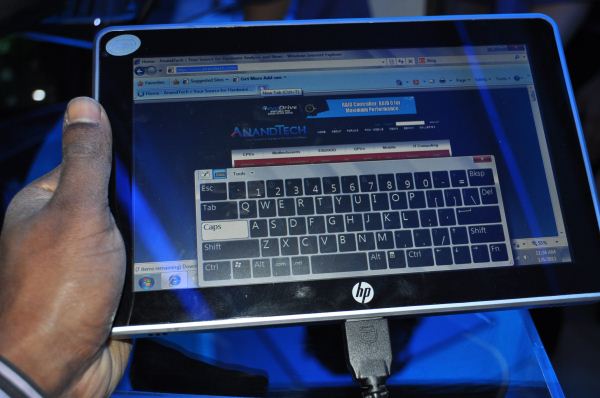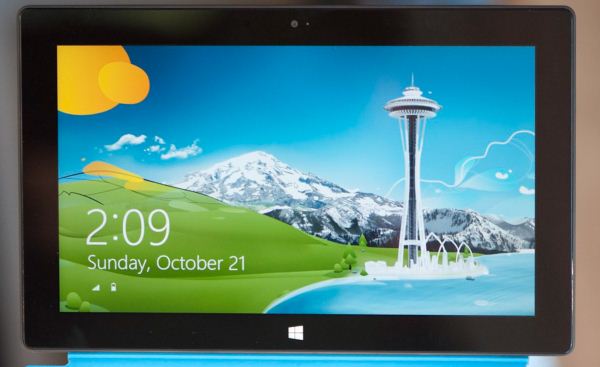The Windows RT Review
by Vivek Gowri & Anand Lal Shimpi on October 25, 2012 12:00 PM EST- Posted in
- Windows RT
- Operating Systems
- Microsoft
- Mobile
- Windows 8
- Tablets
Meet Windows RT
Microsoft’s first serious foray into tablets came just after the turn of the new millenium, with Bill Gates demonstrating the first tablet PC prototype onstage at Comdex in the autumn of 2000. From there, OEMs started releasing tablets based on Windows XP Tablet PC Edition in 2002, with a full range of pen-enabled slates and convertibles releasing over the next few years. In addition to oftentimes prohibitive cost, each had its own set of drawbacks. Convertibles tended to be quite bulky compared to their notebook counterparts (the ThinkPad X-series being a notable exception), while slates were rather difficult to use - a symptom of shoehorning a desktop operating system into a purely touch-centric form factor.
Fast forward a decade, to the beginning of 2010. After a number of conceptual non-starters in the tablet PC space - building tablet PC support into all editions of Windows Vista and 7 (other than Basic/Home Starter), the entire Origami class of devices - Microsoft’s touchscreen devices were floundering. The iPad had been announced to mixed reaction but an extremely high level of anticipation. Microsoft and HP countered with the Slate 500, an Atom-based device shown off at CES 2010 with solid state storage and Windows 7 in roughly the same form factor as Apple’s iPhone OS-based ARM tablet. With speculation pointing to a pricetag of just $549, the Slate appeared to be the most viable hope Microsoft had in trying to make mainstream headway with the tablet PC concept. But shortly after the iPad shipped in April 2010, rumors of the Slate’s demise started to circulate, and after a six month delay, the Slate 500 started shipping as an enterprise-only product in December of that year for $799. HP’s acquisition of Palm (RIP) definitely played a role in the sidelining of the Slate, but more importantly, it essentially spelled the end for the tablet PC. This was news that was perhaps known already, but the Slate saga officially pulled the plug on Microsoft’s original idea of what a tablet was.
The problem was two parts software, one part hardware. Microsoft had developed a very interesting touch-oriented user interface for its handhelds, so at least one part of the equation was relatively straightforward. The hardware issue came down to this: the iOS and Android tablets succeeding in the market ran off ARM system-on-chips, which resulted in slim, power-efficient tablets that had idle times stretching for days. At the time, there was just nothing in terms of x86 hardware that could compete with that in low-power device realm (Clover Trail and Haswell, of course, change this part of the story considerably). The other question? How to converge the touch-centric UI with the classic desktop environment that had been the corner of Windows dating all the way back to 95.
Meet Windows RT. It’s Microsoft’s first major foray into the modern tablet market, the shipping version of Windows-on-ARM, and it’s one of Microsoft’s most important product launches ever. Windows 8 shares the same touch-friendly user interface, but the ARM silicon makes RT an almost entirely tablet-centric operating system, the first for Microsoft. Combined with the focus on premium hardware experiences, this is Redmond’s most serious push to be competitive with the iOS and Androids of the world. How does it fare? Keep reading.












233 Comments
View All Comments
steven75 - Friday, November 2, 2012 - link
iPad 4-finger swipe is pretty damn fast. I'm not sure how it could be faster.eaanders22 - Thursday, October 25, 2012 - link
Microsoft has managed to clutter up what could have been a decent tablet with remnants of an aging operating system. Can you imagine Apple putting a few hooks to the OSX desktop into its iOS tablets that don't give much of the functionality of OSX? A DOS prompt in a tablet, give me a break!Let's face it. Tablets are basically big phone technology. They're not computers in any real sense. Apple recognized this. They had a successful phone and they configured a tablet from it. Doing any significant input or serious analysis on a phone or tablet is a non-starter. You need a decent keyboard and special purpose software for many different kinds of tasks a full blown computer can do.
There is a third approach. Windows and OSX have become beasts of the tech world with complicated user interfaces to give the flexibility and power to do complicated tasks. An alternative to the phone/tablet approach, which is basic output only driven, are devices like the Chromebook which relieve casual users of burden of complexity by doing most of the work in the cloud. This dramatically reduces the learning curve for new users and frees them of the busy work of backups, updates, and security considerations. It can mean cheap, light weight systems with no moving parts that perform both input and output in the simplest possible way. Novice users are put off by the complexity of full blown computers and even by the complexity of modern smartphones and tablets.
Microsoft could have been successful by keeping RT a tablet version of Windows Phone and coming out with a web based verson of Windows like Chromebook. These devices haven't taken off like tablets due to the fact that the user experience with phones easily transferred to tablets, while Google didn't have a base in the full blown computer world to build on. But, there is an audience out there, particularly new users and older users that are tired of putting up with the complexity, lag, and busywork associated with bloated full blown operating systems they don't need to do a little writing, emailing, and multimedia watching. The new $249 Samsung Chromebook that just came out sold out everywhere in a couple days. The new RT devices are twice as costly and twice as complicated to get up to speed on for people looking to continue their quite simple use of a computer for a little emaling, writing, and multimedia watching. Who needs a touch screen for that. It just gets in the way.
The Windows 8 systems are another story. There you get full computing power and the functionality of a tablet in one package. This will fit a wide audience of sophisticated computer and smartphone users.
Dorek - Friday, November 2, 2012 - link
"A DOS prompt in a tablet, give me a break!"Uh, I think it's awesome. It lets you do a lot that iOS could never, ever do.
Chromebooks are never giong to take off. Can you even sync an iPod to a Chromebook?
Shadowmaster625 - Thursday, October 25, 2012 - link
Eventually someone is going to release either a compiler or binary translator or emulator or something that lets you convert a visual studio project to RT. Or even run the x86 executable itself. Right? I should be able to compile my own sleep.exe and launch it from a batch file. How can they stop that, and why would they?andrewaggb - Thursday, October 25, 2012 - link
They might require all apps to be signed to be run. Any apps in the store could be signed by them and any apps that come with windows could be.It would really make it hard to get viruses etc but it would also stop compiling your own without going through the store.
I don't really know what measures are active though.
Jugklutzz - Thursday, October 25, 2012 - link
Hey Guys. Great review.Tablets play a huge base in cloud base storage. What are the options for mounting a NAS?
Best Regards,
Mike
mattlach - Thursday, October 25, 2012 - link
RT does nothing for me.Main reason I have not bought a tablet is because of both Android and iOS not being able to run full featured desktop software.
To me the brilliance of Windows 8 is what it does for x86 tablets, that can be both for full desktop use AND tablet use.
We don't need another limited tablet OS like Android and iOS. RT Is a complete waste IMHO.
THizzle7XU - Thursday, October 25, 2012 - link
"If you’re really concerned about the state of third-party apps, you just have to wait and see. I’ve seen a lot of snap judgements made about Windows RT in the last couple of days based on the dearth of good applications in Windows Store, and while I agree with that sentiment, I feel like it’s extremely shortsighted to write off the ecosystem already. Neither version of the OS has gone on sale yet, and we know that there are a number of applications that will go live on the official release date, as well as many more coming in the weeks ahead."Exactly what I was thinking when reading the complaints on The Verge and some other sites. They claim there are no apps, and I'm thinking...well, technically there is no Windows RT yet for anyone because it's not out yet! And as a developer, I know how they think. Why release something earlier than you have to? You want as much time as possible to work on code and QA. If no one but some media and beta testers don't have the OS yet, what's the rush to release a version 1.0 app? So these sensationalist pseudo-tech editors can rip your early app apart too?
nofumble62 - Thursday, October 25, 2012 - link
Apps launch time is too slow for my patience.Haswell convertible laptop would be a killer.
Tablet and laptop will converge next year.
gsurath - Friday, October 26, 2012 - link
Fantastic review. From this point of view I can now clearly see corporate boardrooms across the world with RT based tablets sitting on the desks. I can see people carrying them all around the office. I think that is where RT will win big. I see corporates creating their own RT apps for employees to access. This review along with Anand's on Surface reconfirms to me that Windows has just paved the way to dominate the office market for a few years to come. Will this mean that people will then use this single device across all their needs? No so sure given the number of gadgets we tend to collect, I still think will find a space. With Office 2013 for ARM being made available, Android too will have the capabilities of RT in the future. All in all, the future is interesting.